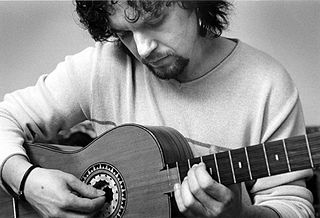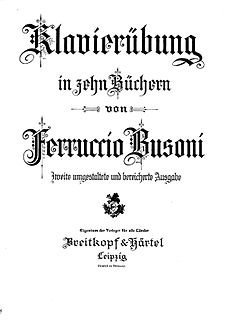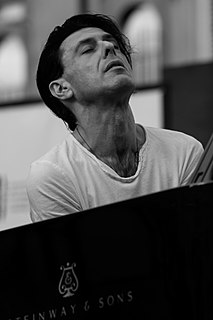| Look up tarantella or tarantelle in Wiktionary, the free dictionary. |
Tarantella is a type of Italian folk dance.
Tarantella or Tarantelle (in French) may also refer to:
| Look up tarantella or tarantelle in Wiktionary, the free dictionary. |
Tarantella is a type of Italian folk dance.
Tarantella or Tarantelle (in French) may also refer to:
| This disambiguation page lists articles associated with the title Tarantella. If an internal link led you here, you may wish to change the link to point directly to the intended article. |

A nocturne is usually a musical composition that is inspired by, or evocative of, the night. Historically, nocturne is a very old term applied to night Offices and, since the Middle Ages, to divisions in the canonical hour of Matins.
The Mazurka is a Polish folk dance in triple meter, usually at a lively tempo, and with "strong accents unsystematically placed on the second or third beat". Originally from the cultural region of Mazovia, it is one of Poland's national dances. The Mazurka, alongside the polka dance, became popular at the ballrooms of Europe in the 19th century, particularly through the notable works by Frédéric Chopin.
Tarantella is a group of various folk dances characterized by a fast upbeat tempo, usually in 6
8 time, accompanied by tambourines. It is among the most recognized forms of traditional southern Italian music. The specific dance-name varies with every region, for instance tammurriata in Campania, pizzica in the Salento region, and Sonu a ballu in Calabria. Tarantella is popular in Southern Italy and Argentina. The term may appear as tarantello in a linguistically masculine construction.

Les Sylphides is a short, non-narrative ballet blanc.
Bolero is a Cuban genre of song developed in the late 19th century.

Pulcinella is a one-act ballet by Igor Stravinsky based on an 18th-century play, Quatre Polichinelles semblables. Pulcinella is a stock character originating from commedia dell'arte.
Hershy Kay was an American composer, arranger, and orchestrator. He is most noteworthy for the orchestrations of several Broadway shows, and for the ballets he arranged for George Balanchine's New York City Ballet. Kay died on December 2, 1981 in Danbury, Connecticut.
"La danza" (1835) is a patter song by Gioachino Rossini, in Tarantella napoletana time, the eighth song of the collection Les soirées musicales (1830–1835). The lyrics are by Count Carlo Pepoli (it), librettist of Vincenzo Bellini's opera I puritani. "La danza" is a stand-alone chamber vocal piece, rather than part of a larger work.
Tarantella is a ballet choreographed by George Balanchine to Grande Tarantelle by Louis Moreau Gottschalk, arranged by Hershy Kay. The ballet premiered on January 7, 1964 at the New York City Center, performed by New York City Ballet's Patricia McBride and Edward Villella.
Grande Tarantelle, Op. 67, is a tarantella written by American composer Louis Moreau Gottschalk from 1858-64. Subtitled Célèbre Tarentelle, it was first performed at the Academy of music in Philadelphia in 1864.
La Boutique fantasque, also known as The Magic Toyshop or The Fantastic Toyshop, is a ballet in one act conceived by Léonide Massine, who devised the choreography for a libretto written with the artist André Derain, a pioneer of Fauvism. Derain also designed the décor and costumes for the ballet. Ottorino Respighi wrote the music based on piano pieces by Gioachino Rossini. Its world premiere was at the Alhambra Theatre in London on 5 June 1919, performed by Sergei Diaghilev's Ballets Russes.

Marcello Vitale is a virtuoso performer and recording artist on the chitarra battente and baroque guitar, as well as a composer and a teacher of these instruments.

Adolfo Fumagalli was a 19th-century Italian virtuoso pianist and composer, known today primarily for his virtuosic compositions for the left hand alone.

The Klavierübung, by the Italian pianist-composer Ferruccio Busoni, is a compilation of piano exercises and practice pieces, including transcriptions of works by other composers and original compositions of his own.
Francesco Libetta is an Italian pianist, composer and conductor.
The Tarantelle in A-flat major, Op. 43 is a short piano piece in tarantella form, written by Frédéric Chopin in June 1841 and published in October 1841. It takes about 3 minutes to play.
Rossiniana, P. 148, is a 1925 orchestral suite by Ottorino Respighi, based on four piano pieces by Gioachino Rossini.

Józef Wieniawski was a Polish pianist, composer, conductor and teacher. He was born in Lublin, the younger brother of the famous violinist Henryk Wieniawski. After Franz Liszt, he was the first pianist to publicly perform all the études by Chopin. He appeared with Liszt in recitals in Paris, London, Copenhagen, Stockholm, Brussels, Leipzig and Amsterdam.

Ezio Bosso was an Italian composer, pianist and double bass player, and conductor. He composed film scores such as Un amore and Gabriele Salvatores' Io non ho paura, and ballets which were performed by The Royal Ballet and the San Francisco Ballet, among others. As a pianist, he released a solo album which entered the Italian charts.